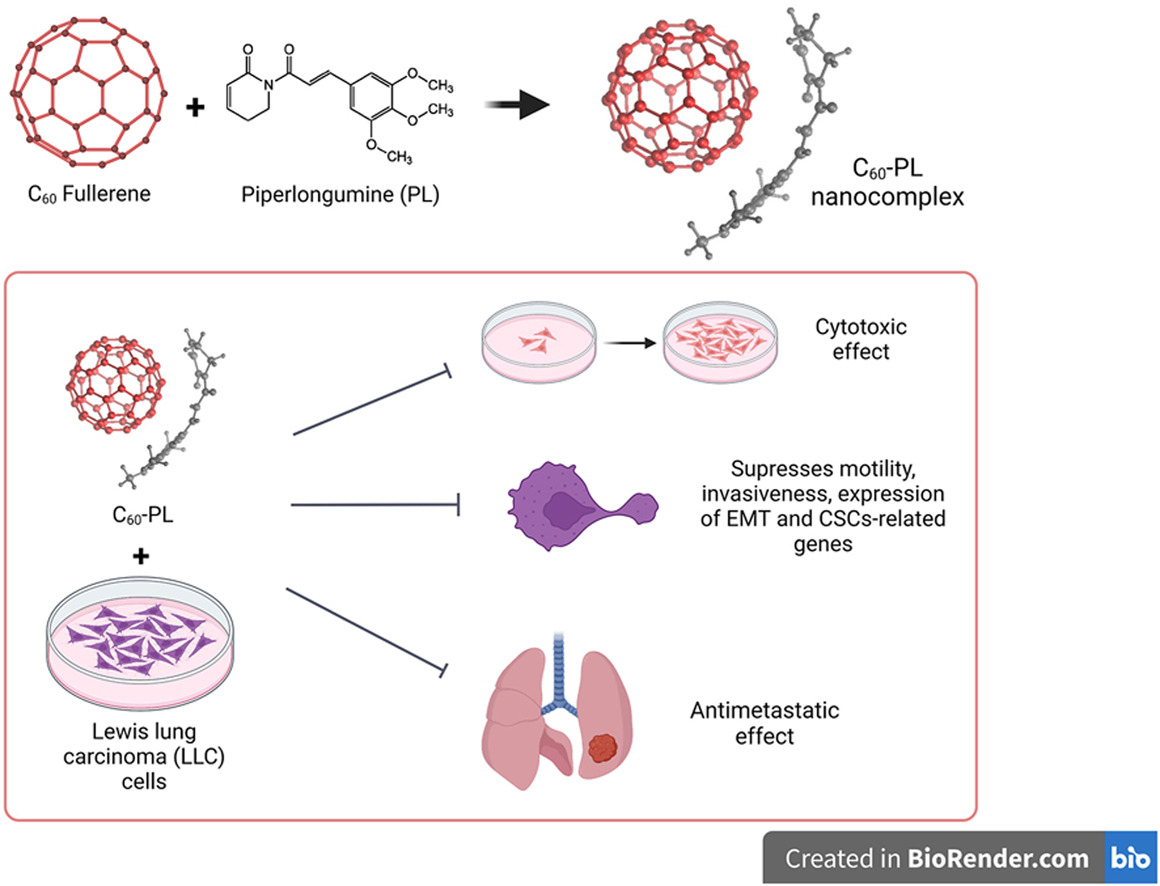A novel nanoformulation, C60 fullerene loaded with a plant alkaloid Piperlongumine (PL) molecules (C60-PL nanocomplex), as a potential drug for the treatment of highly metastatic lung cancer was created and characterized by using ultrasonic technology, computer simulation, atomic force and scanning tunneling microscopy. The aim of the study was to evaluate the antimetastatic potential of PL alone and the C60-PL nanocomplex using Lewis lung carcinoma (LLC) cell line as a model. Evidence has been obtained that the 2:1C60-PL nanocomplex is a potent agent capable of effectively reducing the survival, migration and invasion of LLC cells in vitro, as well as tumor growth and metastasis in vivo compared to free PL. These effects in cell behavior were shown to be associated with an increased Bax expression and high level of cleaved PARP confirming the proapototic potential of C60-PL nanocomplex as well as down-regulation of the mRNA of epithelial-mesenchymal transition regulator Twist1 and cancer stem cell marker CD44, a reduced level of phosphorylated mTOR and adaptor protein Ruk/CIN85. Histological analysis of the lung tissue of LLC-bearing mice showed that in animals that received the C60-PL nanocomplex, the regression of metastases prevailed over their growth. The obtained results allow to conclude that the proposed C60-PL nanocomplex represents a promising drug for the treatment of metastatic lung cancer.

A novel nanoformulation, C60 fullerene loaded with a plant alkaloid Piperlongumine (PL) molecules (C60-PL nanocomplex), as a potential drug for the treatment of highly metastatic lung cancer was created and characterized by using ultrasonic technology, computer simulation, atomic force and scanning tunneling microscopy. The aim of the study was to evaluate the antimetastatic potential of PL alone and the C60-PL nanocomplex using Lewis lung carcinoma (LLC) cell line as a model. Evidence has been obtained that the 2:1C60-PL nanocomplex is a potent agent capable of effectively reducing the survival, migration and invasion of LLC cells in vitro, as well as tumor growth and metastasis in vivo compared to free PL. These effects in cell behavior were shown to be associated with an increased Bax expression and high level of cleaved PARP confirming the proapototic potential of C60-PL nanocomplex as well as down-regulation of the mRNA of epithelial-mesenchymal transition regulator Twist1 and cancer stem cell marker CD44, a reduced level of phosphorylated mTOR and adaptor protein Ruk/CIN85. Histological analysis of the lung tissue of LLC-bearing mice showed that in animals that received the C60-PL nanocomplex, the regression of metastases prevailed over their growth. The obtained results allow to conclude that the proposed C60-PL nanocomplex represents a promising drug for the treatment of metastatic lung cancer.
